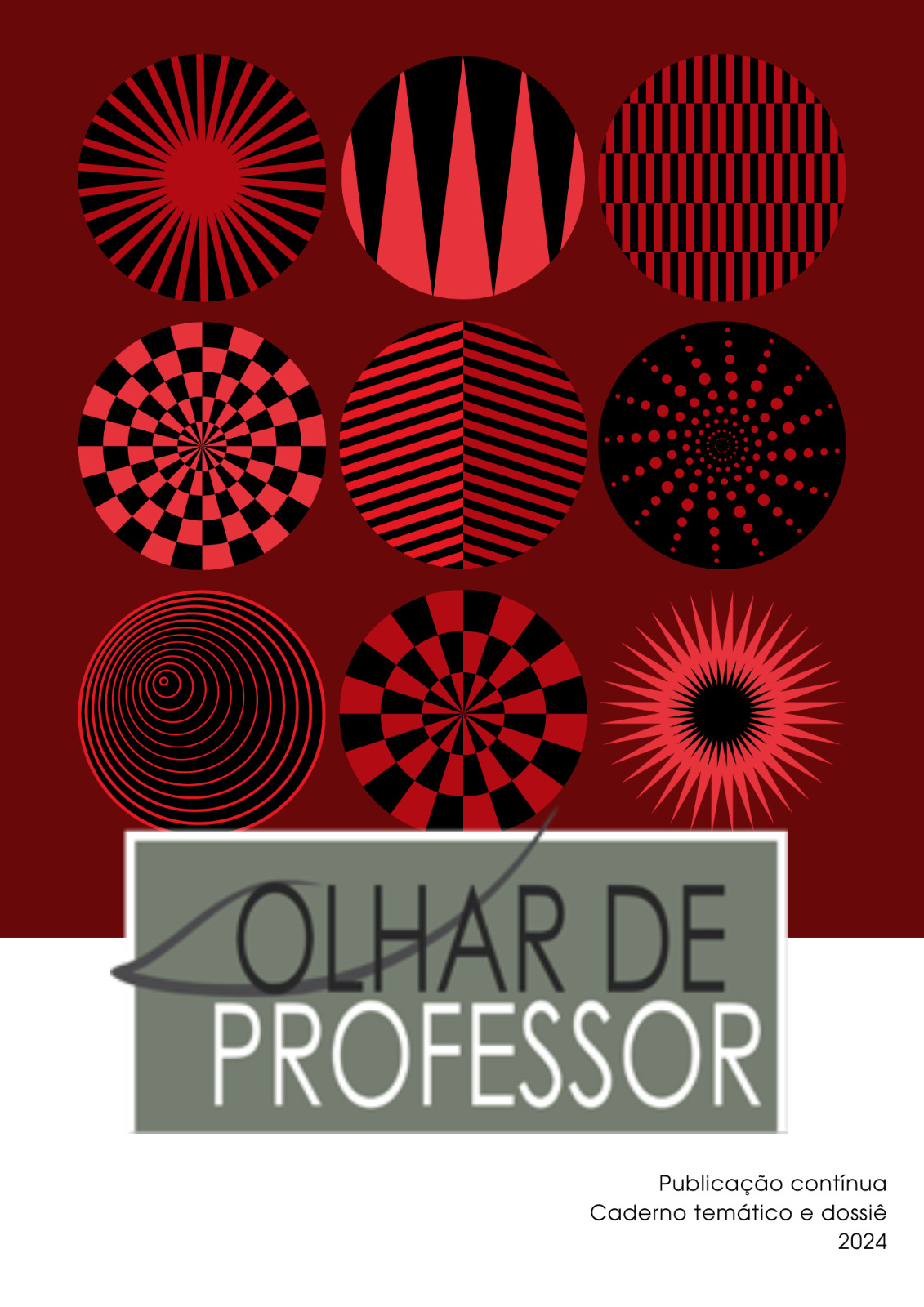Experience report: augmented reality as a tool for dialogic creative writing in the classroom
Main Article Content
Abstract
This article aims to present the active methodology combined with augmented reality technology in the approach to creative writing in the classroom. The research is qualitative, with an interpretive and critical view of the analyzed works. The use of active methodology combined with augmented reality was organized respecting the educational context and the needs of 35 5th-grade students. One of the objectives was to encourage active participation of students in the learning process, as the active method was used as a tool to engage students, allowing them to explore, interact, and create content. Authors such as Assunção (2020) and Moran (2015) emphasize that active methodologies prioritize student involvement in knowledge construction, in contrast to traditional teaching methods where the teacher plays a central role. The results indicate that through augmented reality, it is possible to stimulate critical and creative thinking, offering opportunities for students to develop reflective and creative thinking skills.
Downloads
Article Details

This work is licensed under a Creative Commons Attribution 4.0 International License.
Authors who publish in this journal agree with the following terms:
a) Authors keep the copyrights and concede the right of its first publication to the magazine. The work piece must be simultaneously licensed on the Creative Commons Attribution License which allows the paper sharing, and preserves both the author identity and the right of first publication to this magazine.
b) Authors are authorized to assume additional contracts separately, to not-exclusively distribution of the paper version published in this magazine (e.g.: publish in institutional repository or as a book chapter), with the author identity recognition and its first publication in this magazine.
c) Authors are permitted and stimulated to publish and distribute their papers online (e.g.: in institutional repository or on their personal webpage), considering it can generate productive alterations, as well as increase the impact and the quotations of the published paper.
d) This journal provides public access to all its content, as this allows a greater visibility and reach of published articles and reviews. For more information on this approach, visit the Public Knowledge Project, a project that developed this system to improve the academic and public quality of the research, distributing OJS as well as other software to support the publication system of public access to academic sources.
e) The names and e-mail addresses on this site will be used exclusively for the purposes of the journal and are not available for other purposes.

This work is licensed under a Creative Commons Attribution 4.0 International License.
References
AMABILE, L. R. Do que estamos falando quando falamos de Escrita Criativa. Revista Criação & Crítica, v.28, p.132-149, 2020. https://doi.org/10.11606/issn.1984-1124.i28p132-149. Disponível em: https://www.revistas.usp.br/criacaoecritica/article/view/172813. Acesso em: 16 mai. 2023.
ASSIS BRASIL, L. A. de; et al. Ensinar escrita criativa. Palavras-revista em linha, v.2, n.2, p.55-60, 2019. Disponível em: https://repositorio.pucrs.br/dspace/handle/10923/19451. Acesso em: 21 mai. 2023.
ASSUNÇÃO, B. G.; SILVA, J. T. da. Metodologias ativas: uma reflexão sobre a aprendizagem na atualidade. In: CONGRESSO NACIONAL DE EDUCAÇÃO (CONEDU), 7., 2020, Curitiba. Anais [...] Curitiba: Editora Realize, 2020. p. 10-15. Disponível em: https://editorarealize.com.br/editora/anais/conedu/2020/TRABALHO_EV140_MD1_SA1_ID2434_01102020223933.pdf. Acesso em: 25 abr. 2023.
BACICH, L; MORAN, J. Metodologias ativas para a educação inovadora: uma abordagem teórico-prática. Porto Alegre: Penso, 2018.
BESSA, Sônia; COSTA, Váldina Gonçalves da. Apropriação do conceito de divisão por meio de intervenção pedagógica com metodologias ativas. Bolema: Boletim de Educação Matemática, v. 33, p. 155-176, 2019. Disponível em: https://www.scielo.br/j/bolema/a/xVwsrLfgZZQCXJZgTcCn8Rc/?lang=pt. Acesso em: 12 jul. 2023.
BRANDÃO, T. B.; SANCHES, C.; MARTINEZ, V. Disponível em: https://editorarealize.com.br/editora/anais/conedu/2020/TRABALHO_EV140_MD1_SA1_ID2434_01102020223933.pdf In: SENNA, Instituto Ayrton. Competências socioemocionais: a importância do desenvolvimento e monitoramento para a educação integral. São Paulo: Instituto Ayrton Senna, 2021. Cap. 1. p. 7-10.
CARNAZ, M. E. A. R. Da criatividade à escrita criativa. 2013. 244 f. Dissertação (Mestrado em Didática da Língua Portuguesa) – Escola Superior de Educação – ESEC, Coimbra, 2013. Disponível em: https://comum.rcaap.pt/bitstream/10400.26/12238/1/ELIZABETE_CARNAZ.pdf Acesso em: 13 abr. 2023.
GRINSPUN, Mirian P. S. Zippin (Org.). Educação tecnológica: desafios e perspectivas. São Paulo: Cortez, 2002.
ILDEBRAND, I. dos S.; ROSA, S. H. D. Realidade virtual e aumentada no processo final de alfabetização: problematizando as leituras, as tecnologias e as ciências humanas. Revista Educação & Tecnologia, v. 20, n. 20, p. 65-79, 2020. Disponível em: https://revistas.utfpr.edu.br/pb/index.php/revedutec-ct/article/view/2650. Acesso em: 24 jun. 2023.
MORÁN, J. Mudando a educação com metodologias ativas. In: SOUZA, C. A. de; MORALES, O. E. T. (orgs.). PG: Foca Foto-PROEX/UEPG, 2015. V.II. (Coleção Mídias Contemporâneas). Disponível em: https://moran.eca.usp.br/wp-content/uploads/2013/12/mudando_moran.pdf. Acesso em: 13 mai. 2023.
MOREIRA, M. A.; MASINI, E. A. F. Aprendizagem significativa: a teoria de David Ausubel. São Paulo: Moraes, 1982.
MOTA, A.; WERNER, R. C. Ensaio sobre metodologias ativas: reflexões e propostas. Revista Espaço Pedagógico, v. 25, n. 2, p. 261-276, 2018. Disponível em: https://attena.ufpe.br/handle/123456789/39778. Acesso em: 03 jun. 2023.
NUNES, F.; et. al. The use of augmented reality in pedagogical practices in the areas of sciences and letters: a systematic literature review. SciELO Preprints, 2021. DOI: 10.1590/SciELOPreprints.3020. Disponível em: https://preprints.scielo.org/index.php/scielo/preprint/view/3020. Acesso em: 24 ago. 2023.
PIAGET. J. Psicologia e Pedagogia. Tradução: Dirceu A. Lindoso; Rosa M. R. Silva. 6. ed. São Paulo: Forense Universitária, 2010.
PIMENTEL, F. S. C. Formação de Professores e Novas Tecnologias: possibilidades e desafios da utilização de webquest e webfólio na formação continuada. Especialização (Docência do Ensino Superior) – Universidade Castelo Branco e Departamento de Educação e Cultura do Exército (DECEx). Coordenação de Ensino a Distância. Rio de Janeiro, 2007. Disponível em: https://www.researchgate.net/profile/Fernando-Pimentel-5/publication/266291850. Acesso em: 15 jul. 2023.
SILVA, Y. M. da. Da leitura e produção textual à escrita criativa literária em sala de aula. Anais VII ENLIJE. Campina Grande: Realize Editora, 2018. Disponível em: https://www.editorarealize.com.br/editora/anais/enlije/2018/TRABALHO_EV120_MD1_SA2_ID20_11052018214555.pdf. Acesso em: 11 jun. 2023.
SOARES, V. T. Jogos digitais e o ensino aprendizagem: gamificação. Revista Santa Rita, p. 20, 2020. Disponível em: https://unisan-uni.edu.br/wp-content/uploads/2020/12/Revista-SRita-34-122020.pdf#page=20. Acesso em: 11 ago. 2023.





